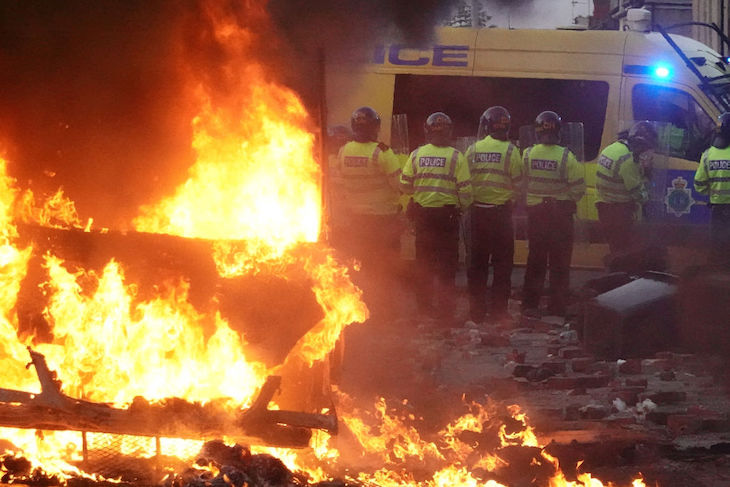Will Southport’s suffering never end? First, the Merseyside town was rocked by the barbarism of a frenzied knife attack that left three girls dead and others critically injured. Then it was beset by unrest. Just hours after yesterday’s vigil for the slain girls, thugs clashed with cops. They set a police van on fire and threw bricks at a mosque. It was a grim orgy of destruction that insulted the quiet dignity the good people of Southport have shown since evil visited their town on Monday.
Double standards have crept into the discussion of Southport’s disorder
Everyone of good conscience will condemn yesterday’s riotous events. Thirty-nine officers were injured, eight seriously. As to the disorder at a mosque: that was an act of bristling bigotry, plain and simple. There is no evidence the knifeman is a Muslim. Even if he was, violent agitation at a mosque would be a mad, intolerable response. Febrile protests at places of worship are always wrong. A moral rule I wish the opinion-forming classes had done more to uphold when Britain’s Jews were being harassed at synagogues in the wake of Hamas’s 7 October pogrom.
And yet, condemnation is not enough. It’s the easy bit. Firing off tweets about Southport’s ‘sickening’ riot is a breeze in comparison with the far harder task that now confronts us – which is to tease out the origins of this rage. To ask why people seem so cross. To inquire – seriously – into the febrile atmosphere that has befallen certain working-class communities. The chattering classes can condemn yesterday’s rioters as thick gammon as much as they like, but to some of us, things are rather more complicated than that.
Already, double standards have crept into the discussion of Southport’s disorder. After the Harehills riot in Leeds, where largely immigrant communities clashed with cops over the removal of four Roma kids from their family, there was a palpable strain of empathy in the media coverage. Not so following last night’s events. X/Twitter is awash with haughty condemnations of these dumb thugs, these trackie-wearing oafs, these ‘racists’ who were likely programmed to hate by lies they read online.
Keir Starmer was heckled by upset Merseysiders when he visited Southport yesterday and that was noisily condemned, too. ‘When are you going to do something?’, one heckler asked Sir Keir. ‘Make a real change’, said another. The Mayor of Liverpool accused the hecklers of trying to ‘weaponise the deaths of three children’. Please. Show some respect. This is a community racked with grief. They have a right to be angry. They have a right to question the Prime Minister.
There is a rush, already, to paint Southport as a hotbed of prejudice and idiocy. Yes, there has been misinformation in Southport, and reckless behaviour, and it all requires rebuke. But to my mind, what we are witnessing is not only an uprising of bigots but something else: people’s sense that no one listens to them, or gives a damn about them. It’s this that makes them seethe.
We need to get real about the impact that something like Monday’s atrocity can have on a town like Southport. It will have caused not only deep sorrow but profound feelings of insecurity, too. That young girls were attacked at a dance class will make some Merseysiders wonder if anywhere is safe. It could shake their faith in their own community. Starmer says he is now ‘absolutely determined’ to tackle ‘knife crime’. Yet even this is a morally insufficient response. What happened in Southport was not ‘knife crime’. It was not some gangland stabbing of the sort that’s become all too common in Britain. It was a colossal act of evil that will scar Southport for years.
The people of Southport need more than platitudes about fighting crime. They need a recognition from officialdom that a truly unholy act was carried out on their children and it was an offence against everything Britain stands for.
But the horror of what happened in Southport must not be downplayed. It is not enough for people to be told ‘Don’t look back in anger’, as has happened following other acts of violence. Open debate must not be discouraged out of a pompous dread that someone somewhere might say something bigoted. Failure to have an open and honest conversation, to listen to all theories and calmly test the truth behind them, would make things worse.
There may be difficult questions about immigration, integration and other things – and those questions cannot be written off as the cynical ‘weaponisation’ of a tragedy. The unrest that followed this evil event cannot become a greater subject of discussion than the event itself.
Watch more on SpectatorTV:








Comments